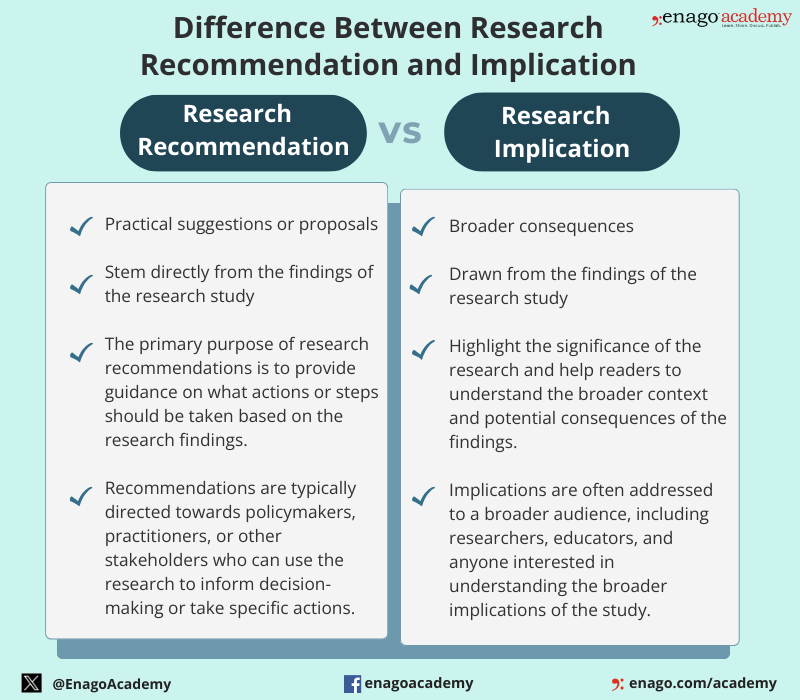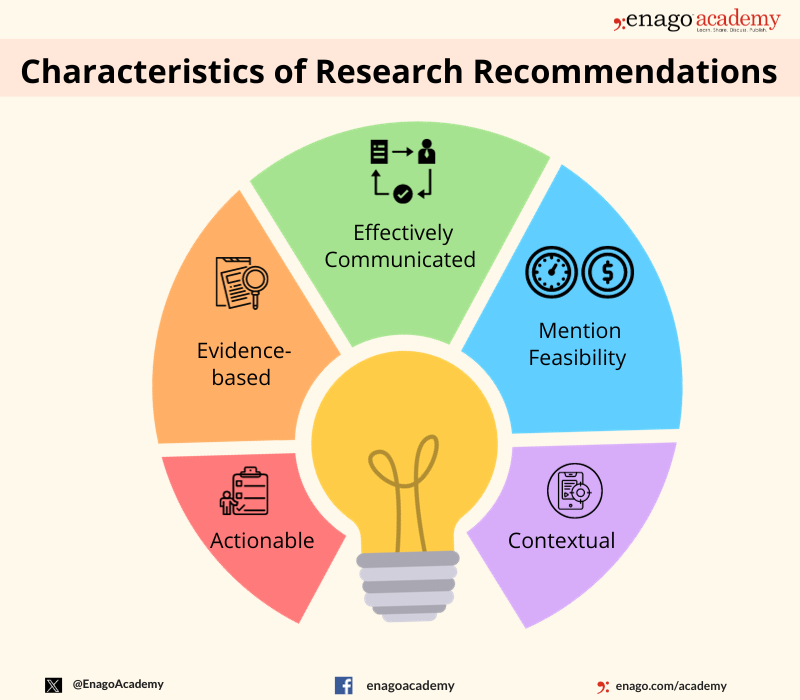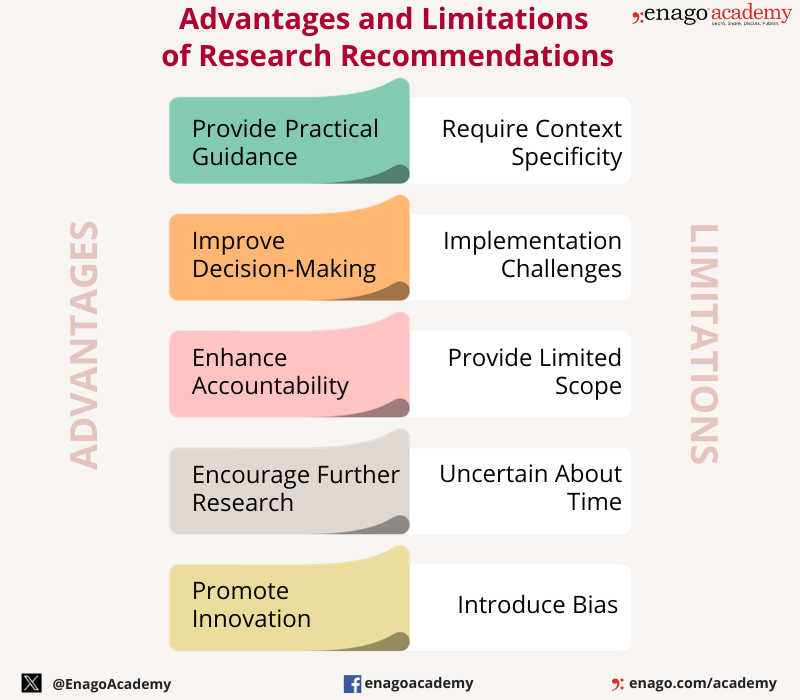Research Recommendations – Guiding policy-makers for evidence-based decision making

Research recommendations play a crucial role in guiding scholars and researchers toward fruitful avenues of exploration. In an era marked by rapid technological advancements and an ever-expanding knowledge base, refining the process of generating research recommendations becomes imperative.
But, what is a research recommendation?
Research recommendations are suggestions or advice provided to researchers to guide their study on a specific topic. They are typically given by experts in the field. Research recommendations are more action-oriented and provide specific guidance for decision-makers, unlike implications that are broader and focus on the broader significance and consequences of the research findings. However, both are crucial components of a research study.
Difference Between Research Recommendations and Implication
Although research recommendations and implications are distinct components of a research study, they are closely related. The differences between them are as follows:

Types of Research Recommendations
Recommendations in research can take various forms, which are as follows:
| Article Recommendations | Suggests specific research articles, papers, or publications |
| Topic Recommendations | Guides researchers toward specific research topics or areas |
| Methodology Recommendations | Offers advice on research methodologies, statistical techniques, or experimental designs |
| Collaboration Recommendations | Connects researchers with others who share similar interests or expertise |
These recommendations aim to assist researchers in navigating the vast landscape of academic knowledge.
Let us dive deeper to know about its key components and the steps to write an impactful research recommendation.
Key Components of Research Recommendations
The key components of research recommendations include defining the research question or objective, specifying research methods, outlining data collection and analysis processes, presenting results and conclusions, addressing limitations, and suggesting areas for future research. Here are some characteristics of research recommendations:

Research recommendations offer various advantages and play a crucial role in ensuring that research findings contribute to positive outcomes in various fields. However, they also have few limitations which highlights the significance of a well-crafted research recommendation in offering the promised advantages.

The importance of research recommendations ranges in various fields, influencing policy-making, program development, product development, marketing strategies, medical practice, and scientific research. Their purpose is to transfer knowledge from researchers to practitioners, policymakers, or stakeholders, facilitating informed decision-making and improving outcomes in different domains.
How to Write Research Recommendations?
Research recommendations can be generated through various means, including algorithmic approaches, expert opinions, or collaborative filtering techniques. Here is a step-wise guide to build your understanding on the development of research recommendations.
1. Understand the Research Question:
Understand the research question and objectives before writing recommendations. Also, ensure that your recommendations are relevant and directly address the goals of the study.
2. Review Existing Literature:
Familiarize yourself with relevant existing literature to help you identify gaps, and offer informed recommendations that contribute to the existing body of research.
3. Consider Research Methods:
Evaluate the appropriateness of different research methods in addressing the research question. Also, consider the nature of the data, the study design, and the specific objectives.
4. Identify Data Collection Techniques:
Gather dataset from diverse authentic sources. Include information such as keywords, abstracts, authors, publication dates, and citation metrics to provide a rich foundation for analysis.
5. Propose Data Analysis Methods:
Suggest appropriate data analysis methods based on the type of data collected. Consider whether statistical analysis, qualitative analysis, or a mixed-methods approach is most suitable.
6. Consider Limitations and Ethical Considerations:
Acknowledge any limitations and potential ethical considerations of the study. Furthermore, address these limitations or mitigate ethical concerns to ensure responsible research.
7. Justify Recommendations:
Explain how your recommendation contributes to addressing the research question or objective. Provide a strong rationale to help researchers understand the importance of following your suggestions.
8. Summarize Recommendations:
Provide a concise summary at the end of the report to emphasize how following these recommendations will contribute to the overall success of the research project.
By following these steps, you can create research recommendations that are actionable and contribute meaningfully to the success of the research project.
Download now to unlock some tips to improve your journey of writing research recommendations.
Example of a Research Recommendation
Here is an example of a research recommendation based on a hypothetical research to improve your understanding.
Research Recommendation: Enhancing Student Learning through Integrated Learning Platforms
Background:
The research study investigated the impact of an integrated learning platform on student learning outcomes in high school mathematics classes. The findings revealed a statistically significant improvement in student performance and engagement when compared to traditional teaching methods.
Recommendation:
In light of the research findings, it is recommended that educational institutions consider adopting and integrating the identified learning platform into their mathematics curriculum. The following specific recommendations are provided:
- Implementation of the Integrated Learning Platform:
Schools are encouraged to adopt the integrated learning platform in mathematics classrooms, ensuring proper training for teachers on its effective utilization.
- Professional Development for Educators:
Develop and implement professional programs to train educators in the effective use of the integrated learning platform to address any challenges teachers may face during the transition.
- Monitoring and Evaluation:
Establish a monitoring and evaluation system to track the impact of the integrated learning platform on student performance over time.
- Resource Allocation:
Allocate sufficient resources, both financial and technical, to support the widespread implementation of the integrated learning platform.
By implementing these recommendations, educational institutions can harness the potential of the integrated learning platform and enhance student learning experiences and academic achievements in mathematics.
This example covers the components of a research recommendation, providing specific actions based on the research findings, identifying the target audience, and outlining practical steps for implementation.
Using AI in Research Recommendation Writing
Enhancing research recommendations is an ongoing endeavor that requires the integration of cutting-edge technologies, collaborative efforts, and ethical considerations. By embracing data-driven approaches and leveraging advanced technologies, the research community can create more effective and personalized recommendation systems. However, it is accompanied by several limitations. Therefore, it is essential to approach the use of AI in research with a critical mindset, and complement its capabilities with human expertise and judgment.
Here are some limitations of integrating AI in writing research recommendation and some ways on how to counter them.
1. Data Bias
AI systems rely heavily on data for training. If the training data is biased or incomplete, the AI model may produce biased results or recommendations.
How to tackle: Audit regularly the model’s performance to identify any discrepancies and adjust the training data and algorithms accordingly.
2. Lack of Understanding of Context:
AI models may struggle to understand the nuanced context of a particular research problem. They may misinterpret information, leading to inaccurate recommendations.
How to tackle: Use AI to characterize research articles and topics. Employ them to extract features like keywords, authorship patterns and content-based details.
3. Ethical Considerations:
AI models might stereotype certain concepts or generate recommendations that could have negative consequences for certain individuals or groups.
How to tackle: Incorporate user feedback mechanisms to reduce redundancies. Establish an ethics review process for AI models in research recommendation writing.
4. Lack of Creativity and Intuition:
AI may struggle with tasks that require a deep understanding of the underlying principles or the ability to think outside the box.
How to tackle: Hybrid approaches can be employed by integrating AI in data analysis and identifying patterns for accelerating the data interpretation process.
5. Interpretability:
Many AI models, especially complex deep learning models, lack transparency on how the model arrived at a particular recommendation.
How to tackle: Implement models like decision trees or linear models. Provide clear explanation of the model architecture, training process, and decision-making criteria.
6. Dynamic Nature of Research:
Research fields are dynamic, and new information is constantly emerging. AI models may struggle to keep up with the rapidly changing landscape and may not be able to adapt to new developments.
How to tackle: Establish a feedback loop for continuous improvement. Regularly update the recommendation system based on user feedback and emerging research trends.
The integration of AI in research recommendation writing holds great promise for advancing knowledge and streamlining the research process. However, navigating these concerns is pivotal in ensuring the responsible deployment of these technologies. Researchers need to understand the use of responsible use of AI in research and must be aware of the ethical considerations.
Exploring research recommendations plays a critical role in shaping the trajectory of scientific inquiry. It serves as a compass, guiding researchers toward more robust methodologies, collaborative endeavors, and innovative approaches. Embracing these suggestions not only enhances the quality of individual studies but also contributes to the collective advancement of human understanding.
Frequently Asked Questions
The purpose of recommendations in research is to provide practical and actionable suggestions based on the study's findings, guiding future actions, policies, or interventions in a specific field or context. Recommendations bridges the gap between research outcomes and their real-world application.
To make a research recommendation, analyze your findings, identify key insights, and propose specific, evidence-based actions. Include the relevance of the recommendations to the study's objectives and provide practical steps for implementation.
Begin a recommendation by succinctly summarizing the key findings of the research. Clearly state the purpose of the recommendation and its intended impact. Use a direct and actionable language to convey the suggested course of action.









